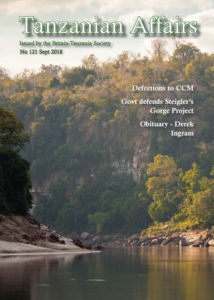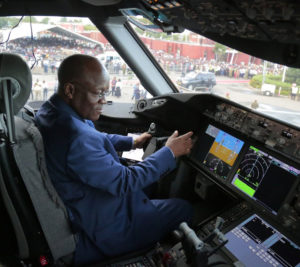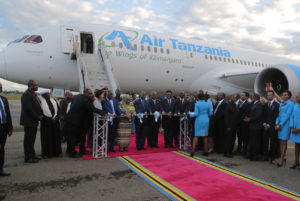by Ben Taylor
Budget estimates presented and disputed
Minister of Finance and Planning, Dr Philip Mpango, presented the government budget for 2018/19 to parliament in June. He told parliament that the TSh 32.5 trillion budget would focus on protecting local industries against competition from imports, and on improving agriculture, industries, social services and logistics.
Dr Abel Kinyondo from REPOA, a think-tank, said protecting local industries is good but should not be done in a way that would affect the productivity and competitiveness of local producers. “Protectionism should be temporary. A non-protectionist mechanism should be put forward to encourage local industries to be competitive, otherwise it will encourage smuggling of foreign goods of higher quality,” he noted.
Dr Semboja Haji from Zanzibar University cautioned against the violation of World Trade Organisation (WTO) rules. “Increasing taxes on imports to protect local industries is all right, but the taxes imposed should not exceed limits put by the WTO,” he noted.
Other highlights of the budget include a removal of VAT on various products including sanitary towels, medicine packing materials and animal food supplements, a tax amnesty proposal (see below), and a marked increase in debt service (see below).
On the expenditure side, the main highlight of the budget is the continued large allocations to large-scale and high-profile mega-projects. This includes TSh 700 billion allocated to the Stiegler’s Gorge hydro-power project, and TSh 4.2 trillion for road and rail infrastructure projects.
In a note of caution, the government said that Tanzania’s economic growth plans could be affected by eight major factors over the coming years, calling upon stakeholders to work with them to come up with mitigation measures. These factors, according to Dr Mpango, include inadequate funds, land ownership conflicts, inadequate participation of the private sector, high rate of population growth, environmental degradation and climate change, regional and global economic and political shocks, natural calamities, and spatial politics that can breed wars and conflicts.
Opposition MP, Zitto Kabwe (ACT Wazalendo, Kigoma Urban), took issue with budget estimates, pointing to repeated failure to meet revenue collection targets and related under-release of funds for development. He asked whether it made sense to keep increasing the size of the budget each year when previous years budgets were never met.
Speaking in an interview with Azam TV, Kabwe said the trend over the past five years was that the government had not met any of their budget estimates. He claimed that for every planned TSh 100, the government had released an average of TSh 65. He added that in the first full financial year of the administration of President Magufuli, the budget increased by 30%, but less than half the funds for development expenditure were ever released.
“The government needs to stop putting up budgets with large numbers when it well knows it has no funds,” he argued.
Another opposition leader, Freeman Mbowe of Chadema, argued that implementation of the budget will be difficult because of the tendency by the government to redirect approved funds to new areas in contravention of the law. With most expenditure decisions being made outside Parliament, said Mr Mbowe, the country finds itself in a situation where very little development funds reach some of the critical sectors while certain ministries receive much more than what was approved by Parliament.
“In 2016/17, for instance, Parliament approved TSh 100.5 billion as development budget for the Ministry of Agriculture, but only TSh 2.5 billion was disbursed,” he said. During the same financial year, the Ministry of Livestock and Fisheries and the Ministry of Water and Irrigation received only 3.25% and 25% of the approved funds, respectively, he said.
He added that some other ministries have received more funds contrary to what was endorsed by Parliament for 2017/18, including the Ministry of Information, Culture, Sports and Arts, the Ministry of Home Affairs, the President’s Office for Regional Administration and Local Government, and the National Electoral Commission. Mr Mbowe claimed that all these Ministries and agencies had spent more than double their budget allocation for the year.
Tax amnesty wins support
The Minister of Finance and Planning, Dr Philip Mpango, announced in his 2018/2019 budget speech that he would be introducing a tax amnesty, allowing firms to settle underpaid taxes from previous years without financial penalties or interest charges. The move is designed to encourage companies to comply voluntarily with resolving backlogs of unpaid or underpaid taxes from previous years.
According to the Minister, the 100% amnesty on interest and penalties will last for six months starting from 1st July 2018 up to 31st December 2018. The move is expected to improve tax compliance by 10% and to increase government revenue by TSh 500 billion.
The Tanzania Revenue Authority (TRA) provided further details in July, explaining that the amnesty will cover only taxes administered by TRA on behalf of the central government, including VAT, income tax, withholding tax, PAYE, excise duty and stamp duty. It is only available to companies that are willing to commit in writing to paying the principal tax amount within the financial year 2018/19 (without penalties or interest charges), and that are willing to drop any objections or appeals that are pending either with TRA or with the tax courts.
The move has been praised by both economists and the business community, though with some reservations. Prof Honest Ngowi of the University of Mzumbe, said that if the tax burden on companies is eased, the measure will help promote private investment. “The resulting conducive investment climate will translate into increased investments, production, employment and business transactions that will lead to new sources of revenue to the treasury,” he argued.
However, Shabu Maurus of Auditax International, writing in The Citizen warned that there are several risks or disadvantages to companies that decide to tax advantage of the amnesty. For example, the requirement that companies must “conclude their tax liabilities without further grievance or dispute” may prevent some firms from engaging, particularly where the difference between tax liabilities claimed by TRA and those accepted by the firms is substantial.
Debt service reaches 30% of budget
For the first time in recent years, the government will spend over 30% of its annual budget for 2018/19 on debt service. This is up from 18% just five years earlier. The amount budgeted for debt service has increased from TSh 3.3 trillion in 2013/14 to TSh 10 trillion in 2018/19.
According to the Minister, Dr Mpango, by April 2018 the public debt stock had reached TSh 49.7 trillion, up from 43.8 trillion in April 2017. This has therefore now reached over 40% of Tanzania’s Gross Domestic Product (GDP).
“Grants and concessional loans which were coming with lower interest rates and long-term yields have declined, forcing the government to rely on external or internal non-concessional loans with high interest rates and short-term yields” said Economics Society of Tanzania chief executive officer Blandina Kilama. “If you are in need and you no longer obtain concessional loan, you must shift to other type of loans which are more expensive. What we are seeing now is that concessional loans have declined and countries are forced to go for non-concessional loans with short terms.”
She said having loans was not a problem but the problem was the rate of growth of loans and where the borrowed was used. “The focus must be on proportionate behaviour between the maturity of loans and maturity of the projects,” Dr Kilama said.
Dr Mpango has in the past defended the growing debt, saying it was within an acceptable limit.
Mpango – Makonda tax dispute
An unusual tax dispute has arisen pitting the Minister of Finance and Planning, Dr Philip Mpango, against the influential Dar es Salaam Regional Commissioner (RC), Paul Makonda.
Dr Mpango took issue with the efforts of Makonda, long seen as one of President John Magufuli’s closest allies in government, to import 20 containers of tables, chairs and blackboards through Dar es Salaam port without paying import duties. The Finance Minister insisted that the taxes – reportedly around Tshs 1.2 billion – must be paid, or the goods seized and sold at public auction.
Mr Makonda explained that the consignment had been imported at his own initiative to improve schools in Dar es Salaam, and that the furniture had been donated by Tanzanians living in the US. The furniture is valued at an estimated TSh 2 billion.
Dr Mpango insisted that the law was categorical that all furniture items imported into Tanzania must be taxed. “I took an oath to enforce tax laws and I will not waver,” declared Dr Mpango in August after inspecting the shipping containers being held by customs officials. “The rule of law must prevail. We will not victimise anyone nor will we fear anyone when it comes to enforcement of tax laws … We must uphold our laws – we can’t play around with taxes.”
The containers arrived at the Dar es Salaam port in January this year with Mr Makonda personally listed as owner of the goods in the shipping documents. The RC is understood to have written to the Tanzania Revenue Authority (TRA) to ask for a waiver, but his request was rejected. On May 12, this year, TRA gave 90 days for owners of 800 containers, including 20 belonging to Mr Makonda, to pay taxes or otherwise they would be auctioned.
President John Magufuli eventually weighed in on the dispute in August, expressing his disappointment over the saga and coming down in support of the Finance Minister. He said the recent decision by Dr Mpango to order the auctioning of the containers was the right move. “According to the laws of the land…no one has the mandate to borrow, bail out or receive donations on behalf of the government without being authorised by the Finance Minister,” said the President.
Before the public auction began at the end of August, Mr Makonda said he will make sure that all containers are not sold, and that he has asked God to block anyone attempting to buy them as the facilities were meant to be distributed to Dar es Salaam schools. “I will hold special prayers to ensure that those containers will never be sold to anyone because I imported them for poor teachers in our region,” he said. He then threatened buyers of the containers, saying their families will be cursed.
“Allow me to ask my fellow leaders in government to carefully select their words when speaking,” responded Dr Mpango. “How would one dare say that whoever buys these products would be cursed? How do we involve God in issues such as these ones?”
The first two attempts to auction the goods were unsuccessful as no bids met the minimum prices set by TRA.
Members of parliament have previously demanded disciplinary action against the Dar es Salaam RC for some of his remarks against MPs, while some opposition leaders have questioned the origin of his alleged oversized influence in government. (The Guardian, The Citizen)
Diaspora remittances
Remittances from the Tanzanian diaspora around the world averaged over TSh 1 trillion each year between 2013 and 2017 (US$2.3 billion over five years), according to the Deputy Minister of Education, Science and Technology, Mr William Ole Nasha. The Minister was speaking in parliament in April on behalf of the Minister of Foreign Affairs and East African Cooperation, in response to a question from Saada Mkuya (CCM, Welezo), herself a former Finance Minister.
The figure remains substantially lower than remittances to other East African countries. The Ugandan diaspora has transmitted over US$ 1 billion each year since 2015, and remittances from the Kenyan diaspora reached US$ 2 billion in 2017, according to figures compiled by The Citizen.
Figures released by the UN Conference on Trade and Development (UNCTAD) in June showed that the cost of sending funds to Tanzania is higher than the cost of sending funds to Kenya, Uganda or Rwanda. Sending £120 from the UK to Tanzania costs 14% of the amount, compared to 13% when sending the same amount to Rwanda, 9% to Uganda and 7% to Kenya.
“It is time the government of Tanzania found ways to encourage more Tanzanians in the diaspora to use formal channels,” said Junior Davis, Chief of the Africa Section at UNCTAD. He suggested the government should do everything in its power to cut the costs for money transfers. (The Citizen)
Foreign Exchange Rate
Helped no doubt by the uncertainty over Brexit, the Tanzanian Shilling has strengthened against the pound and euro in recent months from a low of 3,230 TSh to the pound in April to around 2,950 TSh to the pound in September, which is similar to the rate in September 2017.



